新概念英语第二册课后题答案详解:Lesson25
新概念英语第二册25课
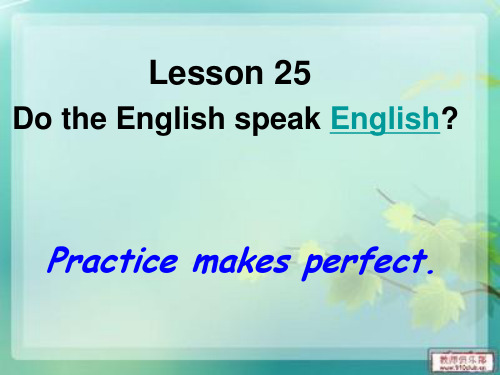
Do English speak English?
British people
a language
The United Kingdom of Great Britain
North Ireland
Scotland
England Welsh
I arrived in London at last.
• ①arrive in + 大地点 • arrive at + 小地点:arrive at my school • 表示“到达”:get to ,reach • ②at last:强调通过努力最后。 • At last , he succeeded in his business. • in the end:强调一种结果 • They broke up several times , but they married in the end. • finally:一种次序上的最后 firstly , secondly,finally
Lesson 25
Do the English speak English?
Practice makes perfect.
railway
• n.铁路(Br) = railroad (Am) • highway freeway expressway motorway(汽车高速公路) • highway:公路 • (Br) = freeway (Am) :汽车高速公路 • expressway快速通道(主要指城市内的,例 如高架桥)
• • • • • • English:n.英语,英国人,英格兰人 adj. 英国的,英格兰的 the English:统称英国人,助动词用复数 English指英语,谓语动词用单数 e.g. English is interesting. The English are friendly.
新概念英语第二册 lesson25详尽版

新概念英语第二册lesson25 Do the English speak English?标题: 在这里均为名词,但意义不同。
第 个指“英国人”,为总称,后面的动词必须用复数第 个指“英语”。
指语言时前面不加冠词,指人则要加 :还可以作形容词,表示“英格兰的”、“英国的”、“英国人的”等;单词:★铁路 路,途径 扶手,栏杆,围栏:火车站 公路 地铁★ 几个可数名词复数 不可数名词可数名词复数 = 一些):一些 即可以修饰可数,又可以修饰不可数… 大量的一段时间 一段时间以前某时 有时 偶尔★ 外国人 蓝眼睛外国人①外国的,海外的外国留学生: 洋货: 外交事务:②陌生的★ 感到奇怪① 对 事情感奇怪② 想要知道③ 对什么感到怀疑你对什么感到疑惑呀?④ … 难怪…奇观世界古代七大奇观极好的练习: 我想知道她什么时候能来。
不知道为什么仓库今天关门了。
我在想你会不会帮我。
’这是个巨大的奇迹。
’课文:大地方 小地方表示到达:强调努力的结果表示一种结局次序上的最后黑暗的( )深的( )忧郁的( )…… … ………… 不仅…而且…他不仅自编剧本,还饰演其中的角色。
这个年轻人不仅聪明,而且很勤奋。
练习: 他不但很聪明,而且很勤奋( )。
他不但吸烟,而且喝酒。
她不但会说 英语,而且会说德语。
这个短语本身的含义是“也”、“又”、“还”:玛丽不仅找到了她姑妈,而且还在她那里住了两星期。
连接整个谓语如果你明天回家,我也回。
他把钢笔借给了我,还有字典。
既不 也不 两者都不(用 … …连接并列主语时,谓语则随最后一个主语的人称和数而变 就近原则)若将 句型变为肯定句,只需把 改为 即可,同时谓语动词必须用复数形式。
练习: 她既不胖也不瘦。
我既没有给他打电话,也没有给他写信。
我既没有钱也没有时间去旅游。
更强调个人或个别, 更强调全体或全部语法:并列句 把两个或几个简单句用并列连词连接起来,则成为一个并列句。
’’’’表示并列关系的并列连词,这类连词主要有 …… … … 等。
新概念英语第二册答案详解

新概念英语第二册答案详解每课的选择题:Lesson 1: bcbdc adbac ccLesson 2: cdcca bbadc dbLesson 3: cacac bccba bbLesson 4: dbabb acbca ccLesson 5: cadbc dabcb bdLesson 6: dacdd adaba daLesson 7: bccda cdacb abLesson 8: dbbac cbbad bbLesson 9: cbdaa bbdbb dcLesson 10: addcb cacac caLesson 11: bbbab ccacc bdLesson 12: ccadd adacd aaLesson : 13 bdbca bbcaa adLesson 14: bcacd bcbcb bbLesson 15: dbcbc dadcc cbLesson 16: aadab adadd daLesson 17: dbbdc cbaac adLesson18 : Bdbdb cdcac cbLesson 19: Adccd bcbca ccLesson 20: Bcbbc bcacc daLesson 21 : cdcda cbbad ccLesson 22: dbddb dacda bbLesson 23: aaacc addbb adLesson 24: baaca acccb abLesson 25: cbbab cdbaa daLesson 26: adcbc ddabd bdLesson 27: dcddd baddc ccLesson 28: cdbbc dbdcd baLesson 29: bccbd babbb cbLesson 30: aadab cccda ddLesson 31: dbaca adabc acLesson 32: cccbb cadad bcLesson 33: dbdac bbccc acLesson 34: dabca dcbcb caLesson 35: adadd adaba ddLesson 36: addcd ccbad ccLesson 37: cbbbb dacdb baLesson 38: bcaac bddba ddLesson 39: dacdd abacc abLesson 40: ccbca acbbb bdLesson 41: aacdc bbada cbLesson 42: dddbb cddac daLesson 43: bbaad daccd acLesson 44: cbccc bdaba bdLesson 45: bdabb dcbcb dbLesson 46: acdda cbcad caLesson 47: dabad aaddc ac Lesson 48: cbcba cbbda bc Lesson 49: dabab ccacc aa Lesson 50: dbacc aadbb cd Lesson 51: bcddd adcad db Lesson 52: bccab dcbac bd Lesson 53: cdacc cdcda cc Lesson 54: dbdbd badcb dd Lesson 55: aabda acabd ab Lesson 56: cacca cabbc cc Lesson 57: abbbb dcdcb da Lesson 58: bdaac bdcad bd Lesson 59: dbddd abada ab Lesson 60: bacbc babac ad Lesson 61: bacca dcabb dd Lesson 62: addcd ccbda db Lesson 63: dbaab ddacd ca Lesson 64: ccccb bccab bb Lesson 65: adbbc aadcc bd Lesson 66: cbaad aabab ba Lesson 67: daddd dbbad dd Lesson 68: bbcdb bbccc aa Lesson 69: abcbb ddaab cd Lesson 70: dbccd bcacd dc Lesson 71: bdbbc cdbbc ba Lesson 72: acadb accdb ad Lesson 73: cadac dadaa db Lesson 74: baccd cacbc ab Lesson 75: cabdb abbdd cc Lesson 76: dbdaa bbacb dd Lesson 77: acabc dddaa ba Lesson 78: acbbc acbab ca Lesson 79: bdcca dbada ac Lesson 80: cbdad cadcc db Lesson 81: daadb bdcbd bd Lesson 82: abadc cdaac bd Lesson 83: bacca bcbcd ab Lesson 84: ccabd cccda cd Lesson 85: ddbab abdbb dc Lesson 86: bcabb bdcab bc Lesson 87: cdcda ccada ad Lesson 88: cbbcc abbcc cb Lesson 89: aadad dadbd db Lesson 90: bccca bcbad dd Lesson 91: dbcbc dbbcb cb Lesson 92: bcdcb abbad ca Lesson 93: cdbac ccdcb db Lesson 94: abcba dacda bc Lesson 95: dabad cdcac dc Lesson 96: dccba dcdab cb这是课后习题的A private conversation私人谈话练习答案 Key to written exercises1.关键句型练习答案A I (1) got (2) very angry (3) .I (1) could not hear (2) the actors (3) .I (1) turned round (2) .I (1) looked at (2) the man and the woman (3) angrily (4) .They (1) did not pay (2) any attention (3) .In the end (6), I (1) could not bear (2) it (3).I (1) turned round (2) again (6) .‘I (1) can't hear (2) a word (3)! ’I (1) said (2) angrily (4) .‘It (1) is (2) none of your business (3) , ’the young man (1) said (2) rudely (4) .‘This (1) is (2) a private conversation(3)!’B 1 I enjoyed the film yesterday.2 I listened to the news carefully.3 The man played the piano well.4 The children played games quietly in their room yesterday.5 He opened the door quietly.6 He left immediately.7 He planted a tree in the corner of the garden.8 He read the letter quickly in his office before lunch.9 I borrowed a book from the library this morning.10 The cook spoilt the soup.11 We stay at home on Sundays.12 There are a lot of people at the bus stop.13 The little boy ate greedily an apple in the kitchen this morning.14 She draws beautifully.15 I like music very much.16 They built a new school in our village last year.17 The match ended at four o'clock.18 She received a letter from her brother last week.Lesson 2Breakfast or lunch?早餐还是午餐?练习答案 Key to written exercises1.关键句型练习答案A 1 are playing…play…is kicking…is running2‘What are you doing?’my landlady asked.‘I'm leaving, Mrs. Lynch, I answered.‘Why are you leaving?’she asked...‘...friends never come to visit me (I)frequently go to bed…I rarely listen…I always feel cold…’B 1 She rarely answers my letters.2 We never work after six o'clock.3 The shops always close on Saturday afternoons.4 Do you always go to work by car?5 Our teacher frequently collects our exercise books.6 We sometimes spend our holidays abroad.7 I often buy CDs.8 Do you ever buy CDs?2.难点练习答案1 What a wonderful garden(this is) !2 What a surprise( this is) !3 What a lot of trouble he is causing!4 What wonderful actors (they are) !5 What a hard-working woman (she is) !6 What a tall building (it is) !7 What a terrible film (it is) !8 What a clever boy you are!9 What a pretty girl (she is) !10 What a strange guy (he is) !Lesson 3Please send me a card请给我寄一张明信片练习答案 Key to written exercises1.关键句型练习答案A went (1.1);visited (1.2) ;sat(1.2) ;taught(1.2);lent;read(1.3) ;did not understand;thought (1.4);passed (1.5) ;did not send(1.5) ;made; go up (1.6) ;bought (1.7) ;spent(1.7) ;did not write(1.8)C …Roy died last year…left me…spent a lot of money…bought one or two…never went to the cinema…stayed at home…listened to music…often lent CDs…they kept them…lost many CDs…2.难点练习答案1 He paid some money to the shopkeeper.2 He handed the prize to me.3 The waiter brought the man a bottle of beer.4 He sold me all his books.5 The shop assistant found me some curtain material.6 He did a big favour for me.7 She showed her new hat to her husband.8 She promised the finder a reward.9 He gave some advice to his son.10 His uncle left some money to/ for him.11 He is teaching us English.12 I bought you this bunch of flowers.13 Bring me that book please.14 He offered a cigarette to me.15 Read the first paragraph to me.16 I've ordered you some soup.17 I owe a lot of money to him.18 Pass your father the mustard.Lesson 4An exciting trip激动人心的旅行练习答案 Key to written exercises1.关键句型练习答案A 1 I have just had breakfast.2 He has been in prison for six months.3 The police have not caught the thief yet.4 You have (already) asked that question three times (already).5 Have you ever been to Switzerland?6 I have never been to Switzerland.7 He is a wonderful runner. He has broken two records so far .8 I haven't seen George lately .C 1 He has just left the house .2 He has just had breakfast .3 She has just written a letter .4 My sister has just turned on the radio .5 My mother has just made the bed .6 She has just bought a new hat.D 1 He hasn't washed the dishes yet .2 She hasn't made the beds yet .3 He hasn't combed his hair yet .4 She hasn't swept the carpet yet .5 We haven't read ‘ Macbeth’yet .E 1 Have you seen the new play at ‘The Globe’yet ?2 Have you taken your holidays yet ?3 Have you read this book yet ?4 Have you done your homework yet ?5 Have you finished your work yet ?2 .难点练习答案1 received2 received3 took4 taken5 takeLesson 5No wrong numbers无错号之虞练习答案 Key to written exercises1.关键句型练习答案A What happened: carried (1.4 ) ; covered (1. 5 )What has happened: has just bought (1.1) ; has just bought (11.3-4);has sent(1.6);has begun(1.8)C 1 What did you buy … ?2 he has never lent …3 Have you burnt … ?4 He fought …5 They have already left .6 When did you lose … ?7 Did you listen … ?8 We have just won …2.难点练习答案A 1 On the way2 in the way3 By the way4 in this/a way5 in the wayB 1 There is a spare wheel in the back of the car.2 I always go on excursions in my spare time.3 ‘Have you any old clothes to spare? ’he asked.4 The guest slept in our spare room.5 ‘Spare me!’begged the prisonerLesson 6Percy Buttons珀西·巴顿斯练习答案 Key to written exercises1.关键句型练习答案A Some meat, a desk, some tobacco, a tin of beans, a comb, acity, a/ some cloth, some oil, a bottle of beer, a day, a word, a student, some sugar, some rain, an orange, a/ some rubberD (sample answers)1 I found an old coin in the garden.2 I put some sugar in my tea.3 I cut some wood for a/ the fire.4 I bought a newspaper yesterday.5 I made some coffee.6 I like the curtains in this room.2.难点练习答案A 1 out 2 over 3 off 4 atB 1 knocked him out2 knock off3 knocked 20% off the priceLesson 7Too late为时太晚练习答案 Key to written exercises1.关键句型练习答案A detectives were waiting(1.1); They were expecting(1.2);detectives were waiting(1.5); others were waiting(1.6);two detectives were keeping guard(11.7-8)B 1 When the plane arrived, some of the detectives were waiting inside the main building while others were waiting on the airfield.2 When two of the detectives opened the parcel, two others were keeping guard at the door.C (sample answers)1 I was getting into my bath when you telephoned me.2 I was reading Hamlet when you saw me in the library this morning.3 I was saying that you must see the new film when you interruped me.D 1 was leaving…arrived 2 worked/ was working…was sitting/ sat3 w as walking…met4 was reading…heard5 was preparing…set/ was setting6 dropped…spoke2.难点练习答案1 He gave all his books away.2 She woke the children up early this morning.4 They cut the king's head off.5 Put your hat and coat on.7 Help me to lift this table up.8 Take your shoes off and put your slippers on.11 They have pulled the old building down.12 Make your mind up.14 She threw all those old newspapers away.Lesson 8The best and the worst最好的和最差的练习答案 Key to written exercises1.关键句型练习答案A 1 Mary's handwriting is worse than Jane's.2 Caroline's handwriting is worse than Mary's and Jane's.3 Caroline's dress is/ was more expensive than Jane's.4 Mary's dress is/ was more expensive than Jane's and Caroline's.B …has the most beautiful garden in our town…‘The Nicest Garden Competition’…garden is larger than Joe's…works harder than Joe and grows more flowers and vegetables…garden is more interesting…for the worst garden in the town!D 1 in 2 of 3 of 4 in2.难点练习答案A 1 believes 2 was 3 triesB Sentences 2, 3 and 5Lesson 10Not for jazz不适于演奏爵士乐练习答案 Key to written exercises1.关键句型练习答案A 1 Our old musical instrument is called a clavichord.2 It was made in Germany.3 It is kept in the living room.4 It was bought many years ago.5 It was damaged recently.6 Two of the strings were broken.7 My father was shocked.8 We aren't allowed to touch it.9 The clavichord is being repaired.2.难点练习答案A 1 of 2 in 3 fromB 1 He borrowed a record of mine.2 She showed me a picture of John's.3 It was an idea of hers.4 A letter of yours was found on my desk.5 Some friends of theirs came to see me.Lesson 252 1.Both my sister and I went shopping.2.We not only got very tired but very hungry as well.3.It was three o\'clock and we could not get lunch so we had a cup of tea.3 1c 2b 3b 4a 5b 6c 7d 8b 9a 10a 11d 12aLesson 261 B believe...are joking...don\'t know...know...believe...forget...looked...are u trying... believe...think...do u live...don\'t know2 \'Look!\'she said,\'isn\'t that man drunk?\'\'I think we should cross the road,\'answered her husband.\'It\'s too late now,\'she replied.\'Eh,you two.Look where you\'re going,\'called the drunk .\'Can\'t u walk in a straight line?\'3 1a 2d 3c 4b 5c 6d 7d 8a 9b 10d 11b 12dLesson 272 1.put their toys away 2.put you up 3.put my shoes on 4.put down5.putting out6.put up7.put off8.put up with3 1d 2c 3d 4d 5d 6b 7a 8d 9d 10c 11c 12cLesson 281 A has just bought(1.2);has had(1.3);has parked(1.4);has not been able(1.5);has put up(1.6);have not had(1.7);has put(1.8);have ever seen(1.9);has been turned(1.10)2 2.who/that 3.whose 4.which 5.that/which3 1c 2d 3b 4b 5c 6d 7b 8d 9c 10d 11b 12aLesson 291 A What happened:flew(1.6);landed(1.8);landed(1.9);wanted(1.10);did not take(1.11) What has happened:has bought(1.1);has begun(1.1);has flown(11.7-8);has just refused(11.9-10)2 1.bring 2.fetch 3.refused 4.deny 5.Very3 1b 2c 3c 4b 5d 6b 7a 8b 9b 10b 11c 12bLesson 301 D 1.Refrigerators are necessary in hot countries.2.Which river is the longest,the Nile,the Amazon,or the Mississippi?3.Heyerdahl crossed the Pacific on a raft.4.Why is Britain sometimes called the United Kingdom?5.We sailed up the Red Sea and then went through the Suez Canal.2 1a 2a 3d 4a 5b 6c 7c 8c 9d 10a 11d 12dLesson 312 1.experienced 2.jobs 3.job 4.save3 1d 2b 3a 4c 5a 6a 7d 8a 9b 10c 11a 12cLesson 322 One day...a postcard...an excursion...one thing...a fax...a form...a fax of one word...3 1c 2c 3c 4b 5b 6c 7a 8d 9a 10d 11b 12cLesson 331 A 1.The girl set out from the coast.2.She jumped into the sea.3.She seam to the shore.B 1.to 2.from/out of 3.(up)to 4.for/from 5.from...to/to...from6.at7.to8.fromC (sample answers)1.A bird flew into the room.2.The parachutist jumped from the aeroplane.3.The child pointed at the fat lady.4.Put the milk in the refrigerator.2 1.the other day 2.passed 3.next 4.past3 1d 2b 3d 4a 5c 6b 7b 8c 9c 10c 11a 12cLesson 342 1.on 2.off 3.out 4.at3 1d 2a 3b 4c 5a 6d 7c 8b 9c 10b 11c 12aLesson 351 C 1.mean...Do u understand ed to smoke...dose not smoke 3.was completed 4.have not seen 5.dropped...was crossing2 1.so 2.such as 3.so 4.such 5.so 6.such a 7.such an3 1a 2d 3a 4d 5d 6a 7d 8a 9b 10a 11d 12dLesson 361 C 1.We are going to leave at six o\'clock.2.I am going to pay these bills tomorrow.3.Are you going to write to him?4.She is not going to look for a new job.5.When are you going to buy a new car?2 1.firm 2.watched 3.look at 4.aolid/firm 5.firm3 1a 2d 3d 4c 5d 6c 7c 8b 9a 10d 11c 12cLesson 372 1.holding...looking forward to 2.look out 3.look...up4.is holding5.look...up6.held...looking forward to3 1c 2b 3b 4b 5b 6d 7a 8c 9d 10b 11b 12cLesson 382 A 1.I had no sooner left the house than it began to rain.2.We had no sooner hung the picture on the wall than it fell down.B 1.continuously 2.continually 3.country3 1b 2c 3a 4a 5c 6b 7d 8d 9b 10a 11d 12dLesson 391d 2a 3c 4d 5d 6a 7b 8a 9c 10c 11a 12bLesson 401 1.were 2.tries 3.will burn 4.would have to 5.lost6.do not apologize7.were8.won9.would not be 10.could2 1.made...to 2.does...makes 3.doing...making 4.made (i)3 1c 2c 3b 4c 5a 6a 7c 8b 9b 10b 11b 12dLesson 411 C 1.mustn\'t 2.mustn\'t 3.needn\'t 4.needn\'t 5.mustn\'t2 1.remarked 2.noticed 3.remarks 4.notice3 1a 2a 3c 4d 5c 6b 7b 8a 9d 10a 11c 12bLesson 421 A 1.had had a long walk(1.1) 2.have a rest(1.2)3.to have a look(1.4)4.had our first glimpse(1.6)B 1.had a ride 2.was having a look 3.had a wash 4.had am5.had a fight6.have had a quarrel7.had another try8.having a rest9.have a smoke 10.have a good sleep2 1.pick it up 2.pick up 3.pick out 4.pick up3 1d 2d 3d 4b 5b 6c 7d 8d 9a 10c 11d 12aLesson 431 A were able to take(1.3);could...get over(1.6);was then able to rise(1.8);would be able to reach(1.9);was able to fly(1.10)2 1.at last 2.at home 3.at once 4.at the moment5.at times6.was at a loss7.At first3 1b 2b 3a 4a 5d 6d 7a 8c 9c 10d 11a 12cLesson 441 A tried to steal(1.4);started running(1.5);continued to run(1.7);needs mending(1.10)B 1.to see 2.working 3.ironing 4.to leave 5.to argue/arguing 6.to come7.seeing 8.knocking 9.waiting 10.to rain/raining 11.working 12.taking2 1.(sample sentences)In the last minutes orf the race,Jim caught up with the leader and passed him.2.The famer shouted at the children and they ran way.3 1c 2b 3c 4c 5c 6b 7d 8a 9b 10a 11b 12dLesson 451 A had been lost(11.1-2);must have been found(11.3-4);was not returned(1.4);had been wrapped(1.6);was sent(1.9);was paid back(1.10)C 1.A meal has been prepared for you.2.The book will be translated into English.3.A telegram must be sent to him.4.The fire had been put out before the fire brigade arrived.5.The cat was given some milk to drink.2 1.back 2.robbed...stole 3.back 4.stole 5.robbed3 1b 2d 3a 4b 5b 6d 7c 8b 9c 10b 11d 12bLesson 461 A arrived at Sydney(1.1);could account for the fact(1.3);accurred to one(1.4);was astonished at what(1.5);was so surprised at being(11.6-7);had been confined to the wooden box(1.9);B 1.with 2.to...for 3.with 4.for 5.to 6.at 7.to 8.to9.for 10.to...at 11.at 12.with 13.with 14.to...for 15.for 16.for17.with 18.for 19.at 20.with 21.to 22.with 23.at 24.to25.with...to 26.to...with 27.for 28.to...to 29.for 30.to 31.for 32.to33.to...with 34.for 35.to 36.to 37.at 38.at 39.with 40.for2 1a 2c 3d 4d 5a 6c 7b 8c 9a 10d 11c 12aLesson 471 C 1.will have finished 2.broke 3.were 4.couldD 1.mustn\'t 2.needn\'tE 1.I asked George what those people were looking at.2.George answered that he did not know.He thought a new road was being built and thatit would be finished soon.3.I told George that all those people were silly because they were looking into an empty hole.4.George said that some piople enjoy/enjoyed watching others work.5.Half an hour passed.George told me to hurry up as we had been there for half an hour.He added that there was nothing to see in an empty hole.6.i answered that I didn\'t want to go yet because it was very interesting.2 1d 2a 3b 4a 5d 6a 7a 8d 9d 10c 11a 12cLesson 481 A 1.which 2.denied 3.fetched 4.too 5.jobs 6.One...a...who7.past 8.next 9.watching 10.continually 11.remarked 12.robbedB (sample sentences)I\'m sorry to cause you such trouble.Have you ever seen such beartiful pictures before?It\'s such a nice day that we can\'t stay indoors!I\'m feeling so tired that I shall have to stop work.C 1.He had no sooner come home than they rang him up from the office.2.The plane had no sooner taken off than it returned to the airport.D 1.made 2.do 3.make 4.do 5.Do 6.make 7.made 8.doesE 1.ou每课的填空题L2Are playing…play…is kicking…is running…are doing…am leaving…arele aving…come…go…listen…feel…L3B went; visited; sat; taught; lent; read; didn’t understand; thought; passed; didn’t send; made; got; bought; spent; didn’t write.C died; left; spend; bought; went; stayed; listened; lent; keep; lost.L4A练习自己做B看课文C 1.He has just left the house.2. he has just had breakfast3. she has just written a letter.4. My sister has just turned on the radio5. My mother has just made the bed6. She has just bought a new hatD1.he hasn’t washed the dishes yet2.she hasn’t made the b eds yet3.he hasn’t combed his hair yet4.she hasn’t swept the carpet yet5.we haven’t read “Macbeth”yetE1. have you seen the new play at”the Glob”yet?2. Have you taken your holidays yet?3. Have you read this book yet?4. Have you done your homework yet?5. Have you finished your work yet?L5B参照课文C1. did buy2. lent3. have you burnt4. fought5. left6. did lose7. did you listen8. have just won用带way的短语填空1. on the way2. in the way3. by the way4. in this way5. in the wayL6P33的参考课文P34A 1.out 2. Over 3.off 4. AtB 1.knocked him out 2. Knock off 3. Knocked 20% off the priceL7P37 D1. was leaving…arrived2. was working…was sitting3. was walking…met4. was reading…heard5. was preparing…was setting6. dropped…spokeL8P42 D 1.in 2.of 3.of 4.in下面235填forL9P45 B1.in2.on3. In4. In5. At6. On…in7. In8. At…in9. untilL10 P501. of2. In3.fromL11 P53B参考课文C1 gets…got2. had3. was writing…talked4. am typing5. passed/were passingDWas built had become died was built were called was begun was completed cost has been cisitedP54 B 1.me to help him 2. Preferred her to stay at home 3.me to speak Chiese 4.me to collect the laundry 5.her to visit you1. salary2.lent…salary3.borrowed4.wages5.wages参考课文的填空我就不写了L13 P63Will be arriving will be coming will be meeting will be singing will be staying will be tryingL14 P661. regretted2.had begun3.arrivedL15 P70B 1.told…would come2. said…had cut3. told…had4. did…say5. did…tell…would buy6. said… could not7. said…had worked8. told…wrote9. did…say…were10. said…would wait1. study2. office3. nervous4. afford5. irritableL16 P73 C1. rains2. pass3. is4. will get5. enjoys6. isD listen do don’t shout is don’t blame want don’t forget am playing don’t send ask is don’t putL18 P82 A1. back2. away3. in4. inB 1.besides 2.besideL21 P94 B1. home2. houses3. house4. homeL22 P971. from2.on3.in4.on5.from6.from7.of8.on9.from 10.in 11.on…in 12.of 13.in 14.on 15.of 16.of 17.from 18.of…on 19.on 20.of…of 21.of 22.from 23.of 24.from 25.in 26.on 27.on 28.from 29.on 30.in 31.from 32.on 33.on 34.in 35.in 36.from 37.on 38.on 39.in 40.of 41.on 42.on 43.of 44.in 45.of 46.in 47.from 48.of 49.in 50.on 51.on 52.of 53.from 54.inL23 P101 C1. wrote2. had finished3. breaks4. shall/will goD 1.told would2. told had lose3. said didn’t likeP1021. It2. There3. There4. There5. It6. It7. There8. It9. There10. ItL24 P106 F1. off2.back3.up4.over5.on6.awau L27 P1321. put…back2. put…up3. put…away4. put down5. put out6. put up7. put off8. put up withL28 P1361. that/which2. who/that3. whose4. which5. that/which6. that/which7. who/whom。
新概念英语第二册第25课_Do_the_English_speak_English_英国人讲的是英语吗
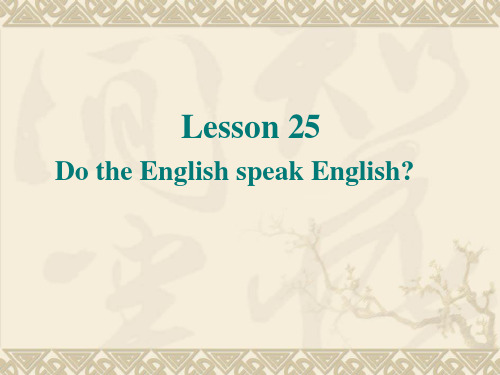
★wonder v. 感到奇怪 ① n. 奇迹,奇观,奇才;惊奇,惊讶 Jane is a wonder. She never fails in her examinations. the seven wonders of the world in ancient times ② vi.&vt. 感到惊讶,感到诧异,对……事情感 奇怪 They wondered that there was a modern building in district. wonder at sth. I wonder at the beauty of the old town.
February
the fourth, 1998 =the fourth of February, 1998
District,(海淀区) BeiJing, China.(最后 一个地点要打上句号)
Haidian
Key structures
并列句中的语序 通过并列连词可以把几个简单句连接起来构成一个 并列句。在并列句中,各分句要根据上下文的要求 按逻辑次序排列,但各分句都同等重要并独立存在。 并列连词可以用来表示另加(and)、对比(but, yet)、选择(or)、连续(and,then)以及结局或 结果(so)。
5、I not only spoke English very carefully, but very clearly as well. not only...but...as well= not only…but also… 不但……而且…… I can speak not only Chinese but English as well. Mary not only found her aunt, but stayed with her for two weeks as well. Not only you but also I will go there.主语并列 (一般不这么用)
新概念英语第二册 lesson25详尽版
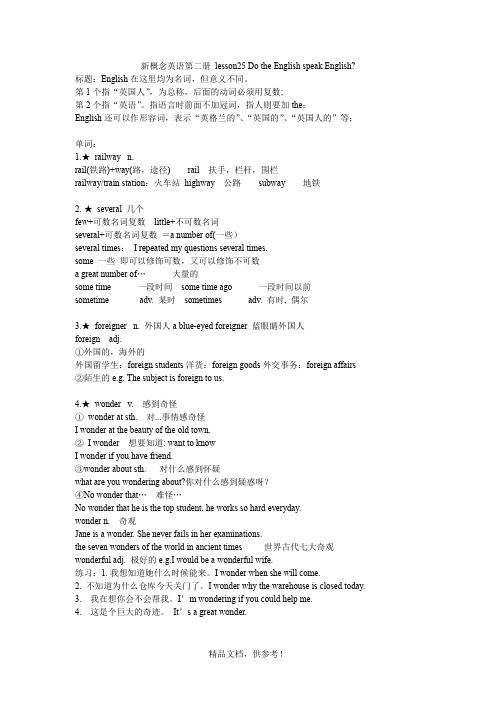
新概念英语第二册lesson25 Do the English speak English?标题:English在这里均为名词,但意义不同。
第1个指“英国人”,为总称,后面的动词必须用复数;第2个指“英语”。
指语言时前面不加冠词,指人则要加the:English还可以作形容词,表示“英格兰的”、“英国的”、“英国人的”等;单词:1.★railway n.rail(铁路)+way(路,途径) rail 扶手,栏杆,围栏railway/train station:火车站highway 公路subway 地铁2.★several 几个few+可数名词复数little+不可数名词several+可数名词复数=a number of(一些)several times:I repeated my questions several times.some 一些即可以修饰可数,又可以修饰不可数a great number of…大量的some time 一段时间some time ago 一段时间以前sometime adv. 某时sometimes adv. 有时, 偶尔3.★foreigner n. 外国人a blue-eyed foreigner 蓝眼睛外国人foreign adj.①外国的,海外的外国留学生:foreign students洋货:foreign goods外交事务:foreign affairs ②陌生的e.g. The subject is foreign to us.4.★wonder v. 感到奇怪①wonder at sth. 对...事情感奇怪I wonder at the beauty of the old town.②I wonder 想要知道: want to knowI wonder if you have friend.③wonder about sth. 对什么感到怀疑what are you wondering about?你对什么感到疑惑呀?④No wonder that…难怪…No wonder that he is the top student, he works so hard everyday.wonder n.奇观Jane is a wonder. She never fails in her examinations.the seven wonders of the world in ancient times 世界古代七大奇观wonderful adj. 极好的e.g.I would be a wonderful wife.练习:1. 我想知道她什么时候能来。
新概念英语第二册 Lesson25~48词组回顾- 带答案

1.抵达___arrive__ __at___/__in______= __get___ __to____ =__reach___2.去酒店的路the ___way___ __to____ the ___hotel___3.不仅...而且__not___ __only__....___but___ ...___as___ __well___4.重复...几次__repeat___ ...__several___ ___times__5.既不...也不... _neither_... ___nor_6.外语__foreign____ ___languages_____7.相互看__look____ __at____ __each____ ___other____8.终于__at__ ___last____9.英国人__the___ _British____10.好看的图案_pretty____ _patterns_11.以相同的方式__in___ the ___same_ _way___12.窗帘布_curtain__ _material___13.欣赏现代艺术__appreciate___ __modern__ __art___14.是...否... __whether___ ...__or___ __not15.快到傍晚的时候___later_ __in____ the afternoon16.搭帐篷___put___ __up___ ___a____ __tent___17.开始下雨___begin___ to____ _rain____= _begin___ _raining___18.爬进帐篷__creep___ __into_ one's ___tent___19.睡得香___sleep____ _soundly___20.半夜__in___ the __middle_ _of____ the ___night___21.满是;充满be __full____ __of____ = be __covered___ with_____22.养成好习惯___form__ a __good__ __habit__23.正好从...下面流过___flow__ __right__ _under___ ....24.熄灭___put___ ___out_25.无法容忍can't __put___ __up____ __with__26.延迟__put____ __off__27.放好,收好__put_ __away___28.罕见的疾病a __rare___ disease29.相信古代神话__believe___ __in______ __ancient______ __myths_____30.自从___ever____ __since____ ...31.与...有冲突__have___ ___trouble___ __with___32.能够做... be __able___ ____to___ do ...33.不能做...be ___unable__ ___to__ do ....34.张贴“禁止停车”的通知__put_ ____up__ “No Parking”__signs___35.有效果__have___ _effect____36.把...变成... __turn____ ...____into___ ....37.不同寻常的出租车___an____ __unusual____ taxi38.开启了一项新业务__start_ a new ___service____39.一架小型瑞士飞机a ____small_ _Swedish___ __aeroplane__40.搭载八名乘客___carry__ ___eight__ __passengers__41.最让人惊讶的事情_the__ ___most___ ___surprising___ thing42.耕过的地里a __ploughed___ ___field____43.从...飞往... ___fly__ ___from____.... ____to___...44.一栋公寓楼的屋顶上the _roof_____ ___of____a __block_____ of __flats/apartments____45.废弃的停车场a __deserted____ car ______park__46.拒绝了...的请求___refuse____ a ___request____ ___from____ sb47.孤岛___a____ __lonely____ __iland____48.大西洋__the____ _Atlantic__ Ocean49.横穿公园的小河a __river___ _that___ ___cuts____ __scross___ the park50.在河边___by___ the ___river____51.在天气晴朗的下午____on__ ___fine___ _afternoons____52.向往常一样_as___ ___usual___53.用力踢球__kick____ the ball ___gard___54.经过的船只__passing____ __boats____55.用力打在他身上__strike____ him _hard_____56.冲...大喊_call___ __out___ ____to___ sb57.扔回_throw______ _back___58.年轻时的经历one’s __young____experience__ _____as___ a young man59.院长the _____head___ ___of_____ a hospital60.过去常常... __used______ ____to____ do61.多年积蓄___save_____ ___up____for_ years62.他自己的工作室a ___workshop_____ ______of__ his ___own_____63.在他20多岁的时候____in____ __his______ _____twenties___64.飞机配件____spare____ ____parts____ ____for___ aeroplanes65.漫长的成功之路one’s ____long____ _____way___ ___to_____ __success______66.修自行车___repair_____ ____bicycles________67.经验丰富的工人_____experienced______ ____workers____68.不如以前... not____as____/__so____ .... ___as_____ ...once...69.偷盗的诱惑the ____temptation___ to ____steal____70.尤其在大的商店里___especially___ _____in___ ____large____ shops71.选了店里最贵的一条裙子____choose____ ___one_____ of the ____most____ ___expensive_____ _____dresses___ in the shop72.把...包起来_____wrap___ sth up73.尽快____as____ _____soon___ ___as_____ _possible______ = ______as__ _____soon___ __as____ one ___can_____74.被逮捕be ___arrested_____75.发现,查明____find____ ____out____76.讲述她自己的遭遇____explain____ ___what_____ had ____happened____ __to______ her77.从海岸出发____set____ __out______ __from______ the ___coast_____78.遇到暴风雨be ___caught_____ ____in____ a ____storm____79.天将黑时___toward_____ ____evening___80.游(飞/走/跑)了八英里___cover_____ a __distance______ ____of____ 8 ____miles____81.在悬崖上____on____ the __cliff______82.一到岸边__on______ ____arriving____ at the shore83.挣扎着往峭壁爬去__struggle______ __up______ the ____cliffs____84.几天前___a___ _____few___ days ago = __several______ days____ago____ = the __other___ ___day__85.当地警局the __local____ ___police____86.拜访某人____call____ __on_____ sb87.参观某地___call____ ____at___ sp88.担心... be ___worried___ __about_____ sth/sb = __worry_____ _about______ sb/sth89.被警察找be ___found__ _____by____ the ____police___90.无意中找到;捡起;用车接____pick___ ___up_____91.400英里外的一个小村庄a small __village_____ 400 _miles______ _away____92.期待自行车被找到__expect___ the __bicycle____ to __be_____ ___found_____93.取消___call_____ __off______94.打电话__call_____ sb __up_____95.后悔做了..._regret______ ____doing___96.觉得...令人兴奋的多____find__ ... ____far____ __more_____ __exciting______97.冲出商店__rush_____ ____out_____ _______of__ the shop98.装满钱的袋子a ____bag_____ ____full_____ ____of_____ money99.吓了一大跳__get____ such a __fright_______100.开车逃走____run_____ ____away_____ ______in___ one’s car101.开车撞... _______drive__ one’s car ___at______...102.受损严重be ____badly_____ _damaged_____103.容易认出____easy___ to ___recognize_____104.横渡英吉利海峡swim ___scross____ ____the__ English __Channel____105.创一项新的世界纪录___set___ __up_____ a new _world_____ __record__106.一定会成功be ___sure____ _to____ __succeed____107.训练某人做..._train____ sb ___to_____ ____do____108.打算做... _intend____ ____to____ __do______ =___plan______ ____to_____ __do_______109.喝点东西___have_____ ____something____ __to_______ drink110.固体食物______solid___ ___food______111.四年之后_____in____ 4 _____years____112.许多人a _____great____ _____many____ people113.安全标准_____safety____ _____standards____114.铁路专线a ___special______ ____railway_____ ___line______115.到年底______by___ the _______end__ of this year116.由...所设计be ____designed_____ ___by______117.期待做... _____expect____ __sb_______ ____to_____ ____do_____ ...118.用词典查词____look_____ _____up____ words in the dictionary119.当心__look_______ ____out_____120.梦想做;考虑做____dream_____ __of_______ _____doing____121.安顿下来___settle______ _____down____122.抱怨... ___complain______ _____about/of____123.即使______even___ _____if____ =______even___ ____though_____124.经常下雨______rain___ __continuously_______125.刺骨的冷be ___bitterly______ ___cold______126.感到震惊_____get____ a ____shock_____127.除了天气____except_____ the _____weather____128.超出了他能忍受的程度___more______ ______than___ he could______bear___ 129.在乡下______in___ the ___country______130.一...就... ___no______ ____sooner_____ ... than...131.几乎未来得及...就... ____hardly_____ ...__when______132.拒绝做... ______refuse___ ______to___ ____do_____133.做腿部手术have ____an_____ __operation_______ on one’s __leg_______134.第二天the ___other______ day= the ___following______ day135.要求... ____ask___ _____for____136.询问... ____inquire_____ ___about______137.特病的病人a _____certain____ ______patient___138.允许某人做... _____allow____ sb ____to_____ _____do____139.再住两个星期院_____stay____ _______in__ ____hospital_____ ____for_____ ____another_____ 2 weeks140.病人的亲属a ___relative______ ____of_____ the __patient_______141.穿着黑色紧身连衣裙的身材高大的严肃的女士 a ___large___ _____unsmiling____ ___women______ ____in_____ a _____tight____ black dress142.抬头___look______ ____up_____143.眼睛盯着...one's eyes are ___fixed______ on ...144.交谈___make____ ____conversation_145.多吃_eat_____ ____more_____146.少说____talk____ _____less____147.绝望地____in____ ____despair____148.喧闹___make____ ___noise_____149.承诺____make____ a____promise150.取得进步___make_____ _progress______151.赚钱_____make___ ___money_152.演说__make_____ a __speech_____153.犯错____make____ a __mistake____154.下定决心___make_____ __up____ one’s ___mind____155.帮...忙__do_____ sb a _____favour____156.买东西____do_____ some ____shopping_____157.生意好_____do___ a good _____business___158.对...无礼be ____rube_____ ___about______ sth to sb159.照镜子look at oneself ______in___ the _____mirror____160.提醒某人.... ___remind______ sb ____of_____ ....161.看起来像___look______ _____like____162.被...覆盖be ____covered_____ ____with_____163.弹奏曲子_____play____ a ___tune______164.第一次瞥见______catch/have___ one's first ___glimpse______ of ...165.从...里面爬出来____rise_____ ______out___ of ...166.随着...动_____follow___ the ___movement______ of167.分辨出...和...的区别____tell_____ the ___difference______ ____between_____ ..._________ ...168.挑选出... __pick____ __out______169.取包裹__pick_______ ____up_____ one’s _____parcel____170.飞越北极the____flight____ _____over____ the______North___ ____Pole_____171.飞越南极_____fly____ ___over______ the____South_____ ___Pole____172.拍了很多照片___take____ ______a___ great_____many____ photographs173.遇到麻烦____run_____ ____into_____ ____trouble_____174.在某个地方______at___ ____one____ ____point_____175.看起来肯定... It ______looks___ ____certain_____ that...176.上升至10,000英尺____rise_____ _____to____ 10,000 feet177.立刻_____at____ ____once_____ /right away178.命令某人做... ____order_____ sb _____to____ ____do_____179.看得见,在视线里______in___ ___sight______180.越过群山____clear_____ the______mountains________181.毫无困难____without_____ ___difficulty______182.目前_____at____ __present_______183.不管怎么说____at____ ______any___ _____rate____184.本质上______at___ _____heart____185.困惑不解;茫然不知_____at____ _____a____ _______loss__186.有时_____at___ ______times___187.冒风险做...______take___ the___risk______ ___of______ ___doing______ sth188.穿过深林run ___through______ the forest189.冲向他_____run____ ____up_____ ___to______ him190.在森林边上_____at____ the _____edge____ of the forest191.在挣扎(打斗)中_____in____ the_____struggle____192.为某人所有_____in____ one's ___possession______193.气喘吁吁____out_____ ____of_____ ______breath___194.追上...____catch_____ ___up______ ____with_____ sb195.径直向某人跑去run ___straight______ ____at_____ sb196.翻看;浏览______look___ ____through_____197.包里的东西the___contents______ _of________ the bag198.电影的内容the____content_____ _____of____ the film199.需要缝补_____need____ ___mending______200.问心无愧a _____clear____ ___conscience______201.一大笔钱______a___ ______large___ _sum________ _____of____ money202.丢了be ____lost_____ = be/get/go ____missing_____203.一定被...偷了____must_____ ______have___ ___been______ _____stolen____ by... 204.把...还给某人___return______ ...______to___ sb205.用报纸包着be _____wrapped____ ______up___ ______in___ newspaper206.含有一半他丢的钱____contain_____ _____half____ the money he had ____lost_____ 207.连同,加之_together_______ ___with______208.偿还be ____paid_____ ____back_____209.抢银行______rob___ the____bank_____210.抢他的钱____rob_____ him______of___ his money211.装有服装的木箱__wooden_______ boxes ____containing_____ _clothing________ 212.解释,说明____account_____ ____for_____213.极其重be ___extremely_____ ___heavy____214.浮现在某人脑海中__occur_____ ______to___ sb215.惊讶于他看到的be ____astonished___ ____to_____ _____discover___what_ he had _____seen____216.一堆毛织品a_______pile___of__ ____woolen_____ _____goods____217.承认做了___admit____ ___doing______218.被关(闷)在... be ___confined____ ___to______219.支付旅费3500英镑____pay____ £3500 ______for___ the _____cost____ of the__trip_____220.供出售be____up_____ ____for_____ ___sale______221.某地闹鬼sp be ___haunted______222.奇怪的声音a____strange____ __noise______223.被...堵住be ____blocked_____ ___by______224.关灯____turn___ the lights____off_____225.摇头_____shake___ one's __head_____226.赠送____give_____ ___away______227.拔牙____pull_____ _____out____ one's teeth228.休息一会儿____rest____ __for_______ a _____while____229.充满be ____filled_____ _____with____230.越来越多的收集a ___growing______ ____collection_____231.作为对...的回应_____in____ ______response___ ____to_____232.要么...要么... __either_______ ..._____or____ ...233.把药棉从嘴巴里取出来______remove___ the ____cotton_____ _____wool___ _____from____ one’s mouth。
新概念英语第二册 Lesson 25

• • • • • • • • • • • • • •
此外,用 large 表示巨大的事物,带有敬畏的感情色彩。 black adj. 1) 黑色的 ←→ white 2) 发黑的,污染的 Your hands are black. 3) 黑皮肤的 black coffee 纯咖啡 4) 不祥的 black Friday 黑色星期五 5) 黑暗的 (dark) 短语 black and blue 青一块,紫一块 go black 失去知觉,眼前一黑 in the black 有盈余 → in the red 赤字
• 当neither...nor...连接两个主语时,应遵循"就 近原则"。 • Neither dad nor mum is at home today. • Neither you nor I am in. • 若将neither...nor...句型变为肯定句,只需把 neither...nor...改为both...and...即可,同时谓语 动词必须用复数形式。 • Both dad and mum are at home today. 今天父母都 • 在家。
at last 终于,到底(强调努力的结果) e.g. At last, he succeeded in his business. 终于,他生意上成功了。 in the end, finally in the end 表示一种结局,结果 eg. We talked and talked about where to go but stayed at home in the end. 我们不断地讨论去哪, 最后决定呆 在家里。 • finally 通常用于句首,一种次序上的最后 firstly, secondly, finally 第一,第二,最后 eg. Finally, he thanked them and took his leave. 最后,他表示感谢然后离开了。 • • • • • •
新概念英语第二册第25课-Do the English speak English-

新概念英语第二册第25课:Do the English speak English?Lesson 25 Do the English speak English?英国人讲的是英语吗?First listen and then answer the question.听录音,然后回答以下问题。
Why does the writer not understand the porter?I arrived in London at last. The railway station was big, black and dark.我最终到了伦敦。
火车站很大,又黑又暗I did not know the way to my hotel, so I asked a porter. I not only spoke English very carefully, but very clearly as well.我不知道去旅馆的路该怎么走,于是向一个搬运工打听。
我的英语讲得不但特别仔细,而且咬字也特别清晰The porter, however, could not understand me. I repeated my question several times and at last he understood.然而搬运工却不明白我的话。
我把问话重复了许多遍。
他最终听懂了he answered me, but he spoke neither slowly nor clearly. I am a foreigner, I said.他回答了,但他讲得既不慢也不清晰。
“我是个外国人,”我说Then he spoke slowly, but I could not understand him. My teacher never spoke English like that!于是他说得慢了,可我还是听不懂。
新概念英语第二册课后练习题答案详解(第25课).doc

新概念英语第二册课后练习题答案详解( 第 25 课) 新概念英语第二册课后习题Lesson 251. ca. The writer didn 符;b. The porter didn’t know any English与课文实际内容不’t speak English也与实际情况不符;d.The writer was a foreigner虽然是课文涉及的内容,但不是作者不能听懂搬运工人讲话的真正原因,因为作者也懂英语; 只有 c. The writer couldn’t understand the porter’s English最符合课文的实际情况,是准确答案。
2. b根据文章 My teacher never spoke English like that!, b. expected everyone in England to speak like his teacher 出了作者的想法 . 只有说a. didn't think the porter was English中没有这样的暗示 .与事实不符合, 文章c.. doesn't think the English speak English,真实想法 .不是作者的d. thinks that the English speak many differentlanguages 虽然作者是这样说的 , 但是不一定是作者的真实想法.3. b只有选 b. is最符合语法。
a. are不合乎语法,因为English 做“英语”讲时是单数名词,不能跟复数的系动词are; c. was也不合乎语法,因为陈述一种语言的性质应该用一般现在时; d. has (有) 更不符合语法,因为has 不能做系动词。
4. a个疑句是次数提的,回答是how many times多少次,是次数的。
several times ,只有 a.其他3 个都不是次数提的。
新概念英语第二册课后练习题答案详解(第25课)

新概念英语第二册课后练习题答案详解(第25课)新概念英语第二册课后习题Lesson 251. ca. The writer didn’t know any English 与课文实际内容不符;b. The porter didn’t speak English 也与实际情况不符;d. The writer was a foreigner 虽然是课文涉及的内容,但不是作者不能听懂搬运工人讲话的真正原因,因为作者也懂英语;只有c. The writer couldn’t understand the porter’s English 最符合课文的实际情况,是准确答案。
2. b根据文章My teacher never spoke English like that!, 只有b. expected everyone in England to speak like his teacher 说出了作者的想法.a. didn't think the porter was English 与事实不符合,文章中没有这样的暗示.c.. doesn't think the English speak English, 不是作者的真实想法.d. thinks that the English speak many different languages虽然作者是这样说的,但是不一定是作者的真实想法.3. b只有选b. is 最符合语法。
a. are 不合乎语法,因为English 做“英语”讲时是单数名词,不能跟复数的系动词are; c. was 也不合乎语法,因为陈述一种语言的性质应该用一般现在时; d. has (有)更不符合语法,因为has 不能做系动词。
4. a这个疑问句是针对次数提问的,回答是several times ,只有a. how many times 多少次,是问次数的。
其他3个选择都不是对次数提问的。
新概念英语第二册 Lesson25 同步习题(含答案)

新概念英语第二册同步习题Lesson25一.根据句意和汉语提示写出所缺的单词。
1. Tom, you mustn’t play near the _____ (铁路). It’s too dangerous!2. Last summer I went to the harbour, where I saw many _____ (搬运工).3. It was rude of you to stare at those _____ (外国人) when they came to your school.4. I don't _____ (感到奇怪)you’re tired.5. The teacher felt very angry because _____ (几个) students failed to pass the exam.二、用括号里的词连接句子。
1. My mother has been to England. My father has been to England.(both...and) __________________________________________________________2. You can attend the meeting. Your sister can attend the meeting. (either...on)__________________________________________________________3. He didn’t send him a postcard. He didn’t give him a call. (neither...nor)__________________________________________________________4.My mother washes the dishes. My mother sweeps the yard. (not only... but.as well)__________________________________________________________ 5. The teacher isn't going to the park for a picnic this Sunday. The students are going to the park for a picnic this Sunday. (not...but)__________________________________________________________三、下列句子中均有一处错误,请找出错误并改正。
新概念二 Lesson25 课后练习
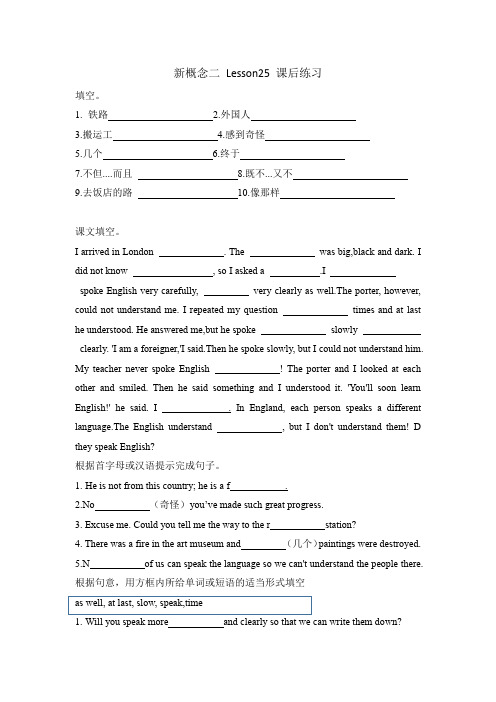
新概念二Lesson25 课后练习填空。
1.铁路2.外国人3.搬运工4.感到奇怪5.几个6.终于7.不但....而且8.既不...又不9.去饭店的路10.像那样课文填空。
I arrived in London . The was big,black and dark. I did not know , so I asked a .Ispoke English very carefully, very clearly as well.The porter, however, could not understand me. I repeated my question times and at last he understood. He answered me,but he spoke slowlyclearly. 'I am a foreigner,'I said.Then he spoke slowly, but I could not understand him. My teacher never spoke English ! The porter and I looked at each other and smiled. Then he said something and I understood it. 'You'll soon learn English!' he said. I . In England, each person speaks a different language.The English understand , but I don't understand them! D they speak English?根据首字母或汉语提示完成句子。
1.He is not from this country; he is a f .2.No (奇怪)you’ve made such great progress.3. Excuse me. Could you tell me the way to the r station?4. There was a fire in the art museum and (几个)paintings were destroyed.5.N of us can speak the language so we can't understand the people there.根据句意,用方框内所给单词或短语的适当形式填空as well, at last, slow, speak,time1.Will you speak more and clearly so that we can write them down?2. She is a good writer and a good teacher .3. Though it was quite difficult,we finished it .4.Each person a different language in England.5. Our English teacher always repeats her question several in the class. 根据汉语意思完成句子。
新概念第二册Lesson25(第25课)
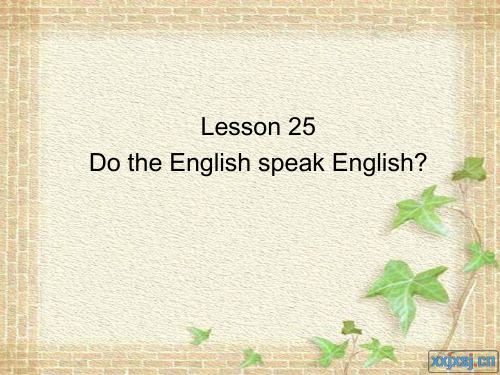
3.I did not know the way to my hotel, so I asked a porter. • the way to:to 是介词,介词短语充当the way的定语,类似的如: • 房门的钥匙:the key to the door • 问题的答案:the answer to the question • 大楼的入口:the entrance to the building • 都表示一种由此及彼的方向。
• 英国的全称为:大不列颠及北爱尔兰联合王国 • The United Kingdom of Great Britain and Northern Ireland(the Britain→the British)
1.I arrived in London at last.
• ①arrive in + 大地点 • arrive at + 小地点:arrive at my school • 表示“到达”:get to ,reach • ②at last:强调通过努力最后。 • e.g.At last,he succeeded in his business. • compare:in the end,finally • in the end:强调一种结果 • e.g.They broke up several times,but married in the end. • finally:一种次序上的最后 firstly,secondly,finally
• 英语当中一般都把第一人称“我”放在并列主语 后面,与中文刚刚相反。 • e.g.My friend and I went to the theatre yesterday.
The Compound Sentence
新概念英语第二册lesson 25
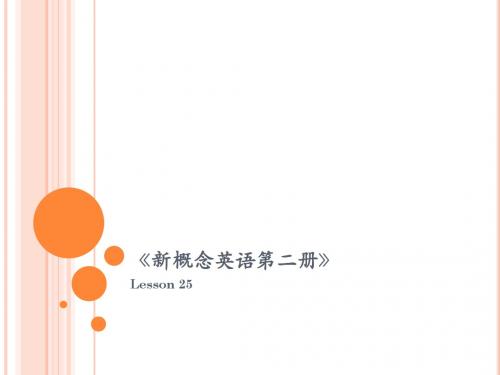
4th February, 1998
Haidian District, Beijing, China.(最后一个地点要打上句号)
KEY STRUCTURE 关键句型
本课关键句型:并列句中的语序 通过并列连词可把几个简单句连起来构成一个并列句。 在并列句中,各分句要根据上下文的要求按逻辑次序 排列,但各分句都同等重要并独立存在。 并列句常用以下连词:and, but, so, yet, or, both…and, either…or, neither…nor, not only…but…as well(or also)
② vi/vt. (对…)感到疑惑,怀疑,想要知道
Wonder +if+从句:是否… I wonder if you have any spare time. Wonder+特殊疑问词+从句:想知道… I wondered where you were going. I wonder how to get there. 问路 No wonder 难怪 wonderful adj. 极好的
Foreigner n. 外国人
Foreign
adj. 外国的,外来的
NEW WORDS AND EXPRESSIONS 生词和短语
Wonder v. 感到奇怪
① n. 奇迹,奇观,奇才,惊奇,惊讶
The seven wonders of the world in ancient times. 七大奇迹
NOTES ON THE TEXT 课文注释
Do the English speak English?
新概念英语第二册课后题答案详解Lesson25

新概念英语第二册课后题答案详解Lesson251. ca. The writer didn’t know any English 与课文实际内容不符;b. The porter didn’t speak English 也与实际情况不符;d.The writer was a foreigner 虽然是课文涉及的内容,但不是作者不能听懂搬运工人讲话的真正原因,因为作者也懂英语;只有c. The writer couldn’t understand the porter’s English 最符合课文的实际情况,是准确答案。
2. b根据文章My teacher never spoke English like that!, 只有b. expected everyone in England to speak like his teacher 说出了作者的想法.a. didn't think the porter was English 与事实不符合,文章中没有这样的暗示.c.. doesn't think the English speak English, 不是作者的真实想法.d. thinks that the English speak many different languages虽然作者是这样说的,但是不一定是作者的真实想法.3. b只有选b. is 最符合语法。
a. are 不合乎语法,因为English做“英语”讲时是单数名词,不能跟复数的系动词are; c. was 也不合乎语法,因为陈述一种语言的性质应该用一般现在时; d. has (有)更不符合语法,因为has 不能做系动词。
4. a这个疑问句是针对次数提问的,回答是several times ,只有a. how many times 多少次,是问次数的。
其他3个选择都不是对次数提问的。
5. b这是一个否定句,只有选c. either 最符合语法。
新概念英语二册Lessons 25课后练习答案

新概念英语二册Lessons 25课后练习答案词汇学习 Word studywonder(1)vt.,vi.感到惊讶,感到诧异:They wondered that there was a modern building in that district.那个地方居然有一座现代化建筑,他们感到很惊讶。
He wondered at the beauty of the old town.这座古老小镇的美丽令他惊讶不已。
(2)vt.,vi.(对……)感到疑惑/怀疑,想知道:I wonder/I'm wondering if we've made a mistake.我怀疑我们是否犯了个错误。
I wonder what will happen next.我很想知道下一步会发生什么事。
Will he come to dinner? I wonder.他会来吃饭吗?我怀疑。
(3)n.奇迹,奇观,奇才;惊奇,惊讶:Jane is a wonder. She never fails in her examinations.简是个奇才。
她从来没有考试不及格过。
She looked at the boss in wonder.她惊讶地看着老板。
the seven wonders of the world in ancient times世界古代7大奇观each other从原则上讲,这个短语指两个人"互相":You and I must try to help each other.你我两个人必须尽力互相协助。
有时,这个短语也能够用来指很多人之间"互相":We must all help each other.我们大家都必须互相协助。
练习答案 Key to written exercises1.关键句型练习答案A and(1.1); so(1.2); not only…but…as well(11.2-3);and(1.5);but(1.5);neither…nor(1.6);but(1.7);and(1.8);and(1.8);and(1.9);but(1.10)C 1 I knocked at the door but he did not open it.2 Both he and I went on holiday.3 He must be either mad or very wise.2.作文练习答案1 Both my sister and I went shopping.2 We not only got very tired but very hungry as well.3 It was three o'clock and we could not get lunch so we had a cup of tea.3.多项选择题答案1c 2b 3b 4a 5b 6c7 d 8 b 9 a 10 a 11d 12 a。
新概念英语第二册第25课Lesson 25-new精编版

_d___ I understood.
• a) who • b) whose • c) whom • d) which
• c) overseas
• d) abroad
My teacher never spoke English like that!
• like:prep.像 • He is very like his father. • 她一定也不像她的妈妈 • She looks nothing like her mother. • Like father,like son. • 有其父必有其子
②陌生的 e.g. The subject is foreign to us.
Adj.+er→n. strange→stranger foreign→foreigner light→lighter(打火机)
Question 10
I come from
• a) foreigner
abroad.I am _a____. • b) strange
Question 6
The porter and I looked at each
other.__c___ both
smiled.
• a) I • b) He • c) We • d) They
Then he said something and I understood it.
Question 7
快速通道(主要指城市内的,例如高架桥)
high way
free way
rail: n.扶手,栏杆,围栏
• 出轨: Jump the rail • 楼梯的扶手 : • stair rails • ride the rails • 逃火车票 • 火车站 • railway station
新概念第二册Lesson25
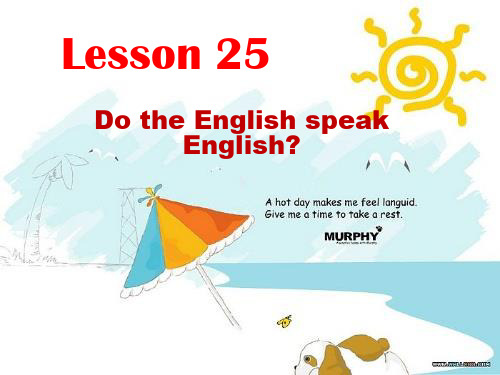
railway
• • • • • •
n.
rail(铁路)+way(路,途径) subway 地铁 火车站 railway station 火车站很大,又黑又暗。 The railway station was big, black and dark.
porter n.
• 搬运工 • port(港口)+er(人) • 不知道去饭店的路应该怎么走,于是向一个 搬运工打听。 • I did not know the way to the hotel, so I asked a porter.
Questions
• 1. Where did the writer arrive? • 2. Why couldn’t the writer understand the porter? • 3. Why does the writer wonder? • 4. Does each person speaks a different language in England?
.
连词
• 功能:将简单句连在一起组成并列句。 • and, but, so, or, • both…and, • either…or, • neither…nor, • not only…but …as well (or also)
either… or…
• • • • 或者… 或者…; 要么…要么… either 他们不是工人,我们也不是 They are not workers. We are not, either. /Neither are we. • 他不是英国人便是法国人。 • He is either an Englishman or a Frenchman. • Either you or I must tell him.
- 1、下载文档前请自行甄别文档内容的完整性,平台不提供额外的编辑、内容补充、找答案等附加服务。
- 2、"仅部分预览"的文档,不可在线预览部分如存在完整性等问题,可反馈申请退款(可完整预览的文档不适用该条件!)。
- 3、如文档侵犯您的权益,请联系客服反馈,我们会尽快为您处理(人工客服工作时间:9:00-18:30)。
新概念英语第二册课后题答案详解:Lesson25
新概念英语第二册课后习题Lesson 25
1. c
a. The writer didn’t know any English 与课文实际内容不
符;b. The porter didn’t speak English 也与实际情况不符;d.
The writer was a foreigner 虽然是课文涉及的内容,但不是作者不
能听懂搬运工人讲话的真正原因,因为作者也懂英语;只有c. The writer couldn’t understand the porter’s English 最符合课文
的实际情况,是准确答案。
2. b
根据文章My teacher never spoke English like that!, 只有b. expected everyone in England to speak like his teacher 说出了
作者的想法.
a. didn't think the porter was English 与事实不符合,文章
中没有这样的暗示.
c.. doesn't think the English speak English, 不是作者的真
实想法.
d. thinks that the English speak many different languages
虽然作者是这样说的,但是不一定是作者的真实想法.
3. b
只有选b. is 最符合语法。
a. are 不合乎语法,因为English
做“英语”讲时是单数名词,不能跟复数的系动词are; c. was 也不
合乎语法,因为陈述一种语言的性质应该用一般现在时; d. has (有)
更不符合语法,因为has 不能做系动词。
4. a
这个疑问句是针对次数提问的,回答是several times ,只有a. how many times 多少次,是问次数的。
其他3个选择都不是对次数提问的。
5. b
这是一个否定句,只有选c. either 最符合语法。
因为只有
either 能够用于否定句中表示“也不”。
a. neither (两者都不)
一般不用于带否定词not的否定句中,它能够同nor 连用; c. too(也) 只能用于肯定句中;d. nor 不能单独使用,只能用neither 连用,表
示“既不……也不”。
6. c
本句中的both 是“两个人”的意思,所以不能选a. I 和 b.
He ,因为她们都是单数人称代词;d. they (他们)能够是两个人,但
若选d.则同前面句子人称不一致,不合乎逻辑; 只有c. We (我们)最
合乎语法和逻辑。
7. d
本句需要选出一个关系代词做定语从句中的宾语.
a. who 只能做定语从句的主语(指人)
b. whose只能做定语从句的定语
c. whom只能做定语从句的宾语,不能指物
d. which能够做定语从句的宾语,指物.
8. b
本句需要选一个与前一句中的several(几个)意思相近的词。
a. much(很多)不是several 的近义词,也不能修饰可数名词;c. only a few(只有少数)同several 的意思不够接近; d. three(3个)太绝对化
了,因为several 虽然可能是3个,但也可能多于3个; 只有b. a number of (一些,几个)同several 的意思相近,所以选b.
9. a
该句需要选出同前一句中的At last(最终)意思相同的词组。
只
有a. in the end(最终)同at last 意思相同。
而b. at least(至少), c. lastly(最后地), d. at the finish 不是准确的表达方式,这3个选择都不符合题目意思。
10. a
只有选a. a foreigner(外国人),才能同前句 I come from abroad(我来自国外)的意思相吻合。
b. strange(陌生的,奇怪的)不
符合题目意思; c. overseas(国外的,海外的)是形容词,也能够作副
词但不如a foreigner 意思准确; d. abroad(出国,在国外)是副词,
I am abroad(我正在国外)与前一句意思不符。
11. d
只有选d. taught(教)最准确。
a. learnt(学习);
b. trained(培训);
c. instructed(指导)这3
个选择都不符合题目意思。
12. a
只有a. am not sure (不确信)同前面的wonder(感到奇怪)的意
思比较接近。
b. am sure (肯定,确信);
c. wander(漫游),
d. know(知道,懂)这3个词的意思都不合乎题目意思。
